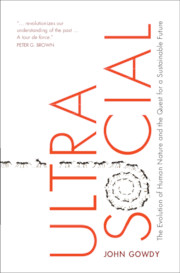Book contents
- Ultrasocial
- Reviews
- Ultrasocial
- Copyright page
- Dedication
- Contents
- Figures
- Tables
- Preface
- Acknowledgments
- Part I The Evolution of Human Ultrasociality
- Part II The Rise and Consolidation of State/Market Societies
- 5 The Rise of State Societies
- 6 The Modern State/Market Superorganism
- 7 Neoliberalism
- Part III Back to the Future
- Notes
- References
- Index
6 - The Modern State/Market Superorganism
from Part II - The Rise and Consolidation of State/Market Societies
Published online by Cambridge University Press: 09 October 2021
- Ultrasocial
- Reviews
- Ultrasocial
- Copyright page
- Dedication
- Contents
- Figures
- Tables
- Preface
- Acknowledgments
- Part I The Evolution of Human Ultrasociality
- Part II The Rise and Consolidation of State/Market Societies
- 5 The Rise of State Societies
- 6 The Modern State/Market Superorganism
- 7 Neoliberalism
- Part III Back to the Future
- Notes
- References
- Index
Summary
With the agricultural revolution, the human economy evolved as an integrated, mutually reinforcing whole. There is no real separation between “market” and “government.” The global human socioeconomic system is a single, unified, integrated superorganism. Without government investment and coordination of economic activity, the system would cease to function. The question is not how much the government spends but where the money goes. Who or what does the state serve? The state/market ultrasocial system is supported by harnessing of lower-level processes to work for the benefit of higher levels. Theorists of social evolution call this downward causation. When human society became ultrasocial, downward causation called forth institutions, belief systems, and political movements that reinforce the goal of surplus production and protect those at the top who control the economic process and the distribution of that surplus.
- Type
- Chapter
- Information
- UltrasocialThe Evolution of Human Nature and the Quest for a Sustainable Future, pp. 115 - 128Publisher: Cambridge University PressPrint publication year: 2021



